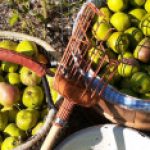
Horse Manure
-
Horse Manure
Posted by Buck on November 15, 2022 at 3:16 amJust curious who all is using composted horse manure on their gardens. I am going to start composting the manure from our horse and would like to use it in our gardens. I do not spray the pasture with anything and the hay is pesticide free too. Should I apply it to all gardens or the ones for certain plants? We grow a little bit of everything. Growing up I would help my grandfather spread horse manure to the sweet potato patch and he grew several sweet potatoes in the 3-5 lb range. So I know it works well for them. Also how much composted horse manure should I add to the gardens?
FLgarden replied 1 year, 10 months ago 11 Members · 23 Replies -
23 Replies
-
We use our horse manure on the garden as well as our pastures. I pretty much use it for everything. As long as it is well composted. Made the mistake of using not so well composted manure one year. Everything grew wonderfully… including the hay seed that sprouted😅.
-
I use all of it when I clean out the horses barn, as long as its composted you can put it on most plants, I till it into my soil, or put it on top of plants for fertilizer. Plants love it.
-
That’s what I gathered from asking around. Let it compose well and everyone seems to be ok putting it around most plants. Thanks.
I checked on small manure spreaders and was shocked at the price. For our gardens I wouldn’t need one but for the pasture, I could see where one would come in handy.
-
Chickens make great manure spreaders.. and you get eggs to boot.
-
-
Be sure that if you are using horse manure that the horses have been vaccinated for tetanus. I asked about using horse manure in a gardening class a few years ago and was told that it would need to be composted first and to make sure the horses the manure comes from had been vaccinated for tetanus. Horses are at a higher risk than most animals of contracting tetanus and the spores are often present in their digestive tract and will be present in manure as well. Most people are vaccinated for tetanus but I happen to be allergic to the tetanus show so I was glad to learn about this because the source of manure I was going to use was from a neighbor’s horse and they had not been vaccinated.
-
Was this from a “master gardener” (university-backed) class? Could they cite any actual research, studies etc that backed this up?
“Spores of tetanus bacteria are everywhere in the environment, including soil, dust, and manure” (see linked citation)
So it’s basically everywhere anyway, part of the problem nowadays is people somehow seem to think we can live in a sterile or sanitary world. We can’t, we either have a good immune system or we don’t, and like muscles, the best way to grow strong is good nutrition and exercise (meaning, not shying away from routine exposure to everyday bacteria and viruses.
Causes and How It Spreads | CDC (take the source for what you will nowadays)
-
Actually yes, this was a Master Gardener class for the San Jacinto Master Gardeners group in San Jacinto County, Texas. The person teaching the class and the one that gave me this information was Tom LeRoy, who has had a 35 year career with the Texas Agricultural Extension Service. He started the Master Gardener Program in Montgomery County, Texas which was the first program started in Texas. Here is a link to his full bio, https://www.gardeningwithtomleroy.com/about/.
-
So again, does he have citations from actual cases of tetanus that occurred due to contact with composted manure from non-vaccinated horses? Remember, they are supposed to be “research-based”, so.. ask to see the research.
I believe wholeheartedly in Science. But it’s a process, a tool used to find things out, and when done properly is quite eager for questions and challenges. Anytime you meet someone promoting “science” that does not welcome discussion, questions, and challenge, take the information for what it’s worth.
I applied for the local 4-H agent position twice in the county I’m moving from, but when they found out I pull information from more than simply the limited font of corporate-funded universities, I was deemed unworthy. My failure to genuflect at the alter of academia also resulted in being declared persona-non-grata at any 4-H event. VE ARE SCIENCE! YOU VILL NOT QUESTION!
(and yet, I routinely direct new gardeners to the extension office for local and basic information, only admonishing them that there are other sources of tried and tested information as well, read widely, experiment liberally) -
and remember.. “Diversity” of species, views, and information, makes us stronger. Mono-opinions are as bad as mono-cultures in plants.
-
-
Thats a new one on me. No such thing as tetanus “spores” in a horses GI tract. I suspect the person had bogus info. You are more likely to contract tetanus walking on a beach barefoot.
-
I actually have read about horses and tetanus in an article one time. I’ll have to see if I can fine it or remember where bc it was years ago but it was a really interesting. It was basically debunking the “rusty nail theories ” and support ing unvarnished info and history about when we used horse roads and people built their barns attached to their houses and why tetanus was so common back then and why the government used that to develop the vax and how the rusty nail theory came to be. Like I said I read that years ago but I remembered that article and whenever my husband got into ground hornets nest and the hospital wanted him to have a tetanus shot, we declined bc of the info I read about tetanus. Lol. Also when he was working for a delivery company and got bit by pitbull dog and the hospital wanted him to have tetanus, we declined bc the rusty nail theory was lies…again I don’t have the article but I have read in the nonvax community that I follow about a connection to horse crap and tetanus debunking the nail. Would I still use horse crap on my gardens yes.. I have many amish friends that do that and are not afraid of tetanus 💁♀️
-
https://deeprootsathome.com/fun-facts-on-tetanus-rusty-nails-horses/
I did find this and probably another reason why we declined tetanus bc it is a vaxs for 3 shots in one!🙄
-
This reply was modified 2 years, 1 month ago by
 KramitDreams.
KramitDreams.
-
This reply was modified 2 years, 1 month ago by
-
-
long before tetanus jab for man and critters my family on a long line of generations have been using horse-manure for gardening and to my knowledge there has not been any issues as long as the horse-manure is well composted or well-rotted over 1.5 ~ 2 years at least
be careful and ask questions of anyone who you may be looking to get horse-manure from as some pesticides cannot be composted or well-rotted out
here are some resources thereof
https://www.rhs.org.uk/soil-composts-mulches/weedkiller-in-manure
https://content.ces.ncsu.edu/herbicide-carryover
hope this helps
bona-fide
-
-
Hi Buck, just wanted to clarify my reply to your question about using horse manure in your garden. First of all, I am not an expert in anything but I like to ask questions to learn as much as I can about things and share information that I think will help. I love that Freesteading.com provides the forums and discussion tools that allow us to share information with each other. I think we all know that a variety of information is available from a variety of sources so I always try to get as much information as I can to make an informed decision. I was trying to be helpful in responding to your question about using horse manure because it was the very same question I asked of someone years ago. While I did not ask the person who answered my questions for citations from actual cases of tetanus that occurred to contact with composted manure from non-vaccinated horses, I do highly respect the person that provided the answer and it was particularly interesting to me when he mentioned tetanus. When I had a severe allergic reaction to a Tdap booster several years ago, my doctor told me not to get the Tdap vaccine again. Since I am a gardener and work with the soil I did a risk assessment and made the decision not to use horse manure in my garden but since it has been stated that the “spores of tetanus bacteria are everywhere in the environment, including soil, dust, and manure”, using horse manure or any other manure might or might not be an issue. I also read that the tetanus spores are highly resistant to heat and “can survive autoclaving at 249.8 degrees F for up to 10 to 15 minutes” (see link below) so the spores may not be eliminated by composting but composting is still necessary to prepare it for the garden. It has been 24 years since my last vaccination and so far no tetanus but that is only my experience 😊. As I said in my initial reply, tetanus is probably not an issue for most people if they are vaccinated but it might for some so again I was only trying to be helpful and hope I did not cause confusion. Here are a couple links to some additional information on tetanus and horse manure:
https://equusmagazine.com/horse-care/facts-about-equine-tetanus/
https://equusmagazine.com/horse-care/protect-yourself-from-tetanus/
https://www.cdc.gov/vaccines/pubs/pinkbook/tetanus.html/
https://www.betterhealth.vic.gov.au/health/healthyliving/tetanus/
Thank you to all in the discussion who have shared their thoughts and insights on this topic. The more information we have the better informed we can be!
-
I see what you are saying. I enjoy reading one’s thoughts on a subject. Thanks for the info.
-
Please do research on Grazon poisoning before you use animal manure.
-
CDC site talks about Tetanus being in manure “Causes & How It Spreads: Tetanus is an infection caused by a bacterium called Clostridium tetani. Spores of tetanus bacteria are everywhere in the environment, including soil, dust, and MANURE.” So it makes sense that unvacinated horses are more likely to spread the toxin. Instead of asking for proof of being right, do your research to prove her wrong, instead of just arguing with her.
-
Composted stall shavings, manure, etc is great. But, your source must have fed hay and feed that was organic- not treated for weeds at any level of the feed process. Glysophate goes through the animal and stays in the compost for at least 3 years. I used it for years but not anymore bc my source suddenly had that stuff in the composted stall compost. It ruined all my dicot veggies. It took 2 more years for it to disapate. Also, different veggies require different ratios of manure. Corn needs a lot but beans need very little.
Log in to reply.
